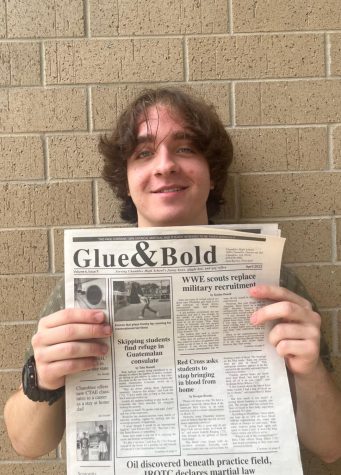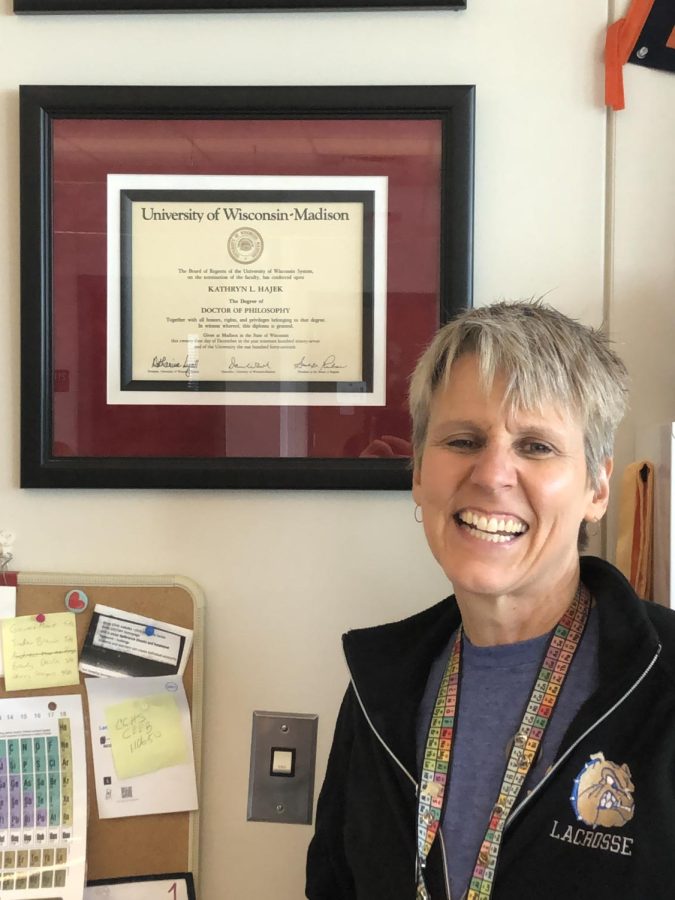Doctors at Chamblee: Alumni of Highest Education
Walking across the stage at their graduation, the American high school student feels a sense of accomplishment. They’ve spent the majority of their lives up to this point working towards this one accomplishment.
But many cross the stage with a question on their mind, what happens next? They may wish to start their career or attend a vocational school (an educational program where one may pursue training for a specific profession), but the majority of high school graduates elect to pursue higher education at one of America’s many colleges and universities to get their Bachelor’s degree. Of that majority, a smaller percentage continue their education further in a bid to obtain their Master’s degrees. An increasingly small number of applicants continue to the highest level of learning and become a Doctor of Philosophy or Ph.D. holder. Several of these excessively qualified individuals teach at Chamblee High School.
Dr. Kathryn Zuehlke has been teaching chemistry at Chamblee for 17 years, starting in 2005. Dr. Zuehlke shares her reasoning for pursuing a career in education.
“ . . . as I got near the end of my graduate experience, I decided I wanted to spend about five years developing curricula for high school teachers and I was getting, like the top 10% of the interview pool, but because I had never taught high school science, they weren’t gonna let me train high school teachers. I was kind of angry and bitter about it. So I decided I would go and teach high school for five years and then go back to the university level,” said Zuehlke.
Though Zuehlke didn’t intend to have an extended stay in the world of public education, her personal life arranged itself to bring her to teaching at Chamblee.
“. . . my husband lived in Buckhead, and I was living in Conyers. We had moved to Decatur and I was tired of the 45-minute commute each way. One of the benefits of teaching high school was there’s always a high school near your house. And so I decided I would shift into teaching in DeKalb County. They actually interviewed me for a geometry job. I’m also certified in math and they had good science candidates. I did well enough on the interview that I sweet talked my way into a chemistry teaching position. I’ve been doing it ever since,” said Zuehlke.
Dr. Yesim Ozberlas teaches AP German at Chamblee, as well as teaching the higher level German 5 and 6 classes. Her research into psycholinguistics informs her teaching style, giving her insight into how students learn languages.
Dr. Ozberlas moved to Atlanta for research, but she found reasons to stay and teach the next generation of German teachers.
“The diversity of the school and also the amazing magnet program, which shows the high potential of German language [DeKalb County] brings since primary school”
In the quote above, Dr. Ozberlas is referring to the DeKalb County magnet program’s efforts in German language education. Students start learning German as early as the fourth grade at DeKalb County’s Kittredge Magnet School, bearing a notable relation to the topic of Ozberlas’s own dissertation (an extensive academic paper written as a requirement for obtaining a PhD).
“My Ph.D. dissertation, I got a grant from the German government. So I [taught] three months in a German class in Germany, and then three months in an English language arts class in a diverse classroom at Inman Middle School in Atlanta. I looked at how migrant-based or minority-based teaching of a teacher impacts the classroom, their language use and cultural knowledge.”
Dr. Lior Burko is currently teaching AP Statistics and Analytic Geometry at Chamblee High School, and has been teaching here for four years. He studied physics at the Technion, or the Israel Institute of Technology in Haifa, Israel, his hometown.
While he is more than qualified to teach mathematics at Chamblee, Burko’s doctorate was focused in a more “science-fiction” field of study.
“My PhD is in physics. Most specifically, the field is general relativity, and more specifically, black hole physics. And my dissertation was about the question of whether a physical object, let’s say an astronaut or a spaceship, can fall into a black hole and not be completely pulverized or destroyed and perhaps have a chance to emerge from a worm hole or white hole into another universe or distant part of this one. I have since worked on other questions, but my dissertation topic was related to the interior of Black holes and the singularities,” said Burko.
Burko’s combined body of work has a total of 2337 scholarly citations, according to Google Scholar, but black holes were only one of the study topics he could have chosen to pursue at the Technion.
“[My professor] offered me three topics to talk about. One is what I described, [ . . . ] The two other topics that he proposed were to work on time machines and the third one, self interaction in general. [ . . . ]. The hottest topic of time machines sounds exotic, interesting, which it is, but it’s sort of a dead end in terms of research careers, because the National Science Foundation has decided 15 or so years ago to not fund research related to that, so I chose the topic that I chose. I did some work on the last one too, but I never really worked on time machines,” said Burko.
Dr. Holly Isserstedt teaches AP Seminar and AP English Language and Composition at Chamblee, as well as sponsoring the National Honor Society at the school.
Dr. Isserstedt’s motivations for obtaining her degree may not be relatable for many Chamblee students, but they did bring her to where she is today.
“I have always enjoyed being a student. And I always knew that I would pursue advanced degrees and I feel like I tried to stay in school as long as I could and learn as much as I could.” said Isserstedt.
For students who are thinking about pursuing a doctorate at Chamblee, Dr. Zuehlke offers some advice.
“I wish I had known a lot of things about my life as an adult that I would have been a lot less worried about certain things. Like that whole race like ‘oh my gosh, I gotta get ahead’ and whatnot. The reality is, when you’re in your 50s nobody really cares whether it took you six years or seven years to get through grad school,” said Zuehlke. “You know, nobody really cares how many AP classes you took when you were a high school senior. You know, what your grades were? Yeah, you had to make good enough grades to get to the college that you wanted to go to but whether you had a 92 or 95 in math class makes no difference.”
Your donation will support the student journalists of Chamblee High School Blue & Gold. Your contribution will allow us to print editions of our work and cover our annual website hosting costs. Currently, we are working to fund a Halloween satire edition.

Jonah Jacobs is a sophomore and Staff Writer at the Blue & Gold, He is a varsity athlete and former candidate for class secretary. In five years, he sees himself as a multi-platinum artist under the pseudonym Kanye West Tha Second. If he could have dinner with anyone in history, he would choose celebrated Parisian artist Jay-Z.






